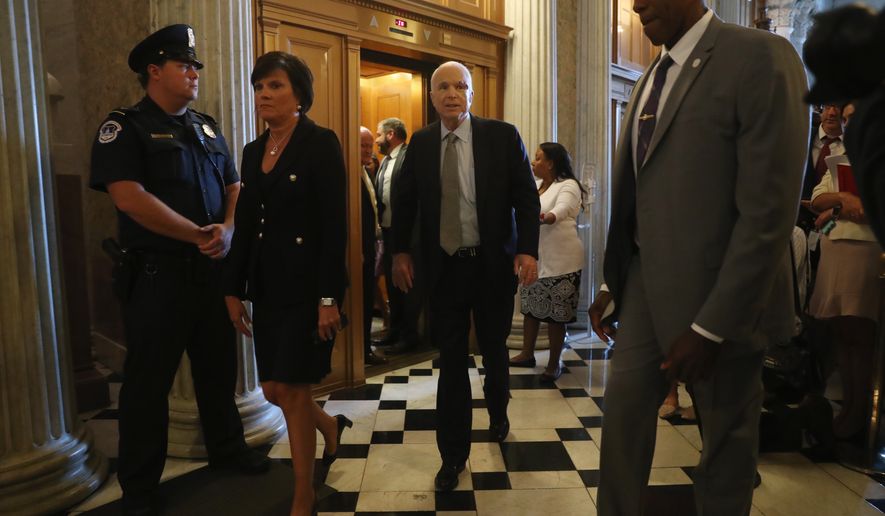Senate Republicans voted Tuesday to begin the debate on how to overhaul Obamacare, overcoming a series of false starts and setting up a weeklong showdown over options ranging from a full repeal to a complicated Republican replacement.
Yet their first try — on a replacement plan that Republican leaders drafted and redrafted for weeks to try to win over conservatives and moderates — was defeated hours later, with nine Republicans voting “no,” underscoring the uphill climb leaders face in trying to tailor a plan on the fly.
Sen. John McCain of Arizona, who has received a shocking brain cancer diagnosis, made a dramatic return to the chamber and, combined with Vice President Mike Pence’s tie-breaking vote, his support was enough to launch the debate.
Republican leaders said it put Congress back on track to keep the party’s promise to repeal the 2010 Affordable Care Act, which extended coverage to millions of Americans but is ailing from rising premiums and dwindling choices.
“The American people elected a House with a vision of a better way on health care, then a Senate, then a president. Now, we have a duty to act,” said Senate Majority Leader Mitch McConnell, Kentucky Republican.
President Trump, who had alternated between cajoling and berating Senate Republicans to begin the debate, said the vote was “a giant step to end the Obamacare nightmare.”
SEE ALSO: Trump calls Senate health care vote ‘big step’ on way to new health care law
“The Senate must now pass a bill and get it to my desk so we can finally end the Obamacare disaster once and for all,” he said in a statement.
The vote marked a high point after weeks of frustration for Republicans, who initially vowed to vote in late June, then early July. Each time, votes were canceled.
The latest option Tuesday was a “skinny repeal” that would scrap only Obamacare’s mandate requiring individuals to hold insurance, rules requiring large employers to provide coverage, and a tax on medical device sales.
That plan likely will be offered later this week if other options fail to win majority support.
Democrats, who have been left out of the process after they refused to contemplate repeal, urged Republicans to “turn back.” They called for bipartisan talks on fixes to Obamacare and warned that Republican-only options will mean sweeping cuts to benefits and insurance coverage.
“All the things you have been trying to avoid will emerge from that conference and hurt you, will hurt the people of your states dramatically,” said Senate Minority Leader Charles E. Schumer, New York Democrat.
SEE ALSO: Donald Trump dings Lisa Murkowski for no-vote on health care debate
As the Senate clerk called the voting roll, Democrats sat in their chairs refusing to vote and glared at Republicans. They delivered their “no” votes, one by one, at the end of the roll call.
Protesters in the gallery shouted, “Kill the bill! Don’t kill us!” Their cries could still be heard once they were shooed into the hallway.
House lawmakers, who passed a replacement bill in May, are rushing toward the exits with a five-week summer vacation awaiting them, but Republican leaders said they will bring the chamber back to vote if the Senate approves an Obamacare repeal.
Among the options senators will likely consider is a redux of a 2015 plan that would gut the law within two years, buying time for a sweeping replacement. Mr. Obama vetoed the bill, but Mr. Trump would sign if Republicans pass it.
This measure is favored by conservatives such as Sen. Rand Paul of Kentucky, who said it mirrors what Republicans promised to voters. Moderates say it’s too risky to hope that Congress figures out a better alternative before Obamacare’s benefits disappear.
All 48 Democrats joined nine Republicans in rejecting another option — the latest version of Mr. McConnell’s replacement bill — which hit the floor first Tuesday night.
Mr. McConnell wrote the bill in secret and tweaked it numerous times to try to win support after too many Republicans balked at early versions.
The bill would have repealed the mandate requiring people to hold insurance or pay a tax and replaced Obamacare’s subsidies with less-generous tax credits while reining in President Obama’s vast expansion of Medicaid and further curtailing federal spending for the program in 2025.
Key parts of the latest bill hadn’t been scored by the Congressional Budget Office, so it was subject to a 60-vote requirement, effectively dooming it before the 57-43 rejection was recorded.
The provisions had been added to mollify holdouts on both ends of the Republican Party spectrum. First, a plan by Sen. Rob Portman of Ohio and several other moderates would have added $100 billion to a long-term stability fund in the plan to help low-income people with out-of-pocket costs when people transition off the Medicaid expansion to private insurance.
Sen. Ted Cruz, Texas Republican, offered the second plank: a “freedom amendment” that would allow insurers to offer plans that do not comply with Obamacare regulations on benefits or ratings so long as they also offer ones that do.
A revised and CBO-scored version that can pass on a simple majority vote could ostensibly return to the floor.
During Tuesday’s procedural vote, two Republicans — Sen. Susan M. Collins of Maine and Lisa Murkowski — joined Democrats in opposing starting the debate. They said they didn’t like the proposals that were offered or weren’t sure which route to repeal might gain top billing
• Tom Howell Jr. can be reached at thowell@washingtontimes.com.




Please read our comment policy before commenting.